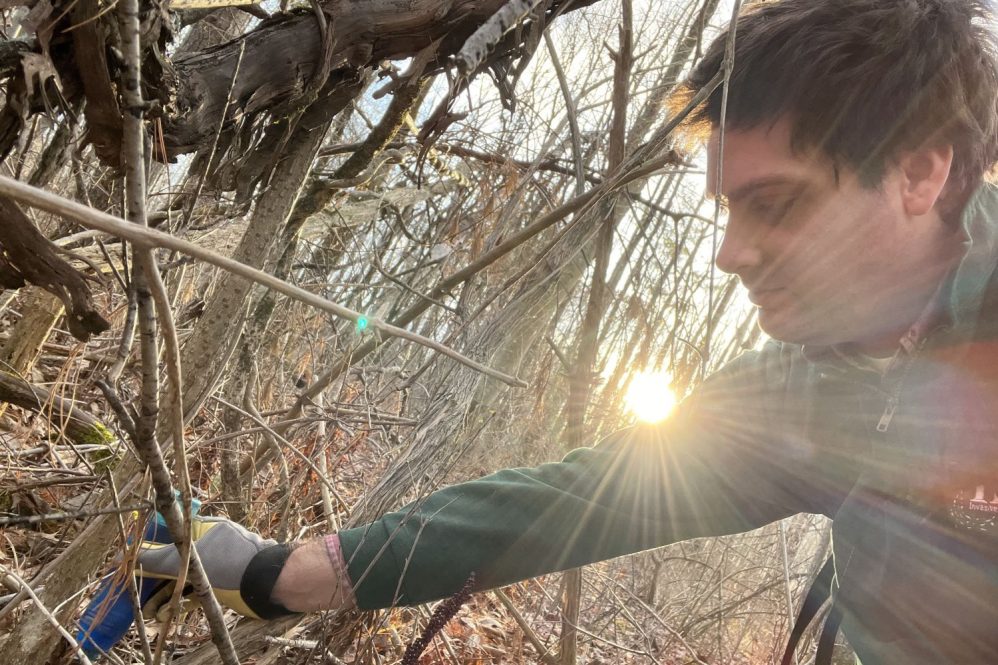Christian Allyn ‘17 (CAHNR) grew up in a house built on an abandoned horse pasture in North Canaan, Connecticut.
Despite being surrounded by nature, Allyn couldn’t enjoy it because the property’s wooded areas were overgrown with invasive vines and shrubs.
“Growing up, my grandparents and my dad would always talk about playing in the woods and I never had the opportunity to do that, and I was like: ‘this is wrong’,” Allyn says.
As a freshman at Housatonic Valley Regional High School, Allyn realized his passion for horticulture. There was a section of the campus filled with invasive plants. But the school couldn’t find a local contractor who could remove them.
“I got involved with that and said: ‘Well, that’s what I’m supposed to be doing’,” Allyn says.
As a horticulture and resource economics double major, Allyn’s coursework and interactions with CAHNR faculty provided him with the knowledge base to create a business that used science to combat the plants that had invaded his surroundings since childhood.
As a junior at UConn, Allyn launched his business, Invasive Plant Solutions. Invasive Plant Solutions provides just that – scientifically based solutions to invasive plant removal and management for the northeast.
Invasive species not only push out native plants that support pollinators and the local ecosystem, some species, like the ubiquitous Japanese Knotweed, can grow into homes and even tear down foundations.
Allyn says his company’s key to managing invasive plants is follow up. All too often, people will kill and remove the invasive plants and call it a day, leaving the door wide open for the plants to grow back.
“For many property owners, it’s a hard sell because they don’t want to be managing,” Allyn says. “They want it to be a ‘one and done’ fix, you come in remove it, and that’s it. But I’ve worked very hard to set the standard that that’s not the case. It’s a continual maintenance program.”
Allyn says his company also prioritizes using herbicides, an essential part of invasive plant removal, as minimally as possible. Invasive Plant Solutions employs licensed herbicide applicators to use herbicides recommended for specific invasive species by research institutions, including UConn. These herbicides are also wetland-safe.
“It’s important to think about herbicide as a prescription,” Allyn says. “You have to use it judiciously.”
Allyn has extensive knowledge of his adversary thanks to faculty he worked with as an undergrad. He worked closely with his advisor Mark Brand, professor of horticulture, who develops non-invasive cultivars of invasive plants, throughout his time at UConn.
“His experience with designing cultivars of known invasive plants like barberry and burning bush was incredible,” Allyn says.
Allyn received a UConn IDEA grant for his work, and was also part of UConn’s entrepreneurship program, Innovation Quest. Both this and the IDEA grant Allyn says, helped him better understand what investors and customers are looking for in a company and bring his idea to reality.
Helping his community tackle invasive plants isn’t the only way Allyn is giving back. At the same time he launched his business, Allyn was elected selectman for the town of North Canaan. He is the youngest person to ever hold the title for the town.
As part of Allyn’s resource economics major, he completed an independent study to write a conservation and development plan for North Canaan, an activity that combined his love for his community and his CAHNR education – all before he had even received his diploma.“When I graduated, I went back to town and I said: ‘Listen, here’s the plan to fix the place – let’s do it,” Allyn says. “And that led me to become elected as the selectman.”
Allyn’s company continues to grow as well. He is completing projects for the Department of Energy and Environmental Protection (DEEP) in state forests, as well as helping residents and business deal with invasive species.
“The system we have built is easy to scale. Now we’re looking for people passionate about invasive plant management to join our team and expand the company’s ability to provide high quality service statewide.”
Follow UConn CAHNR on social media



